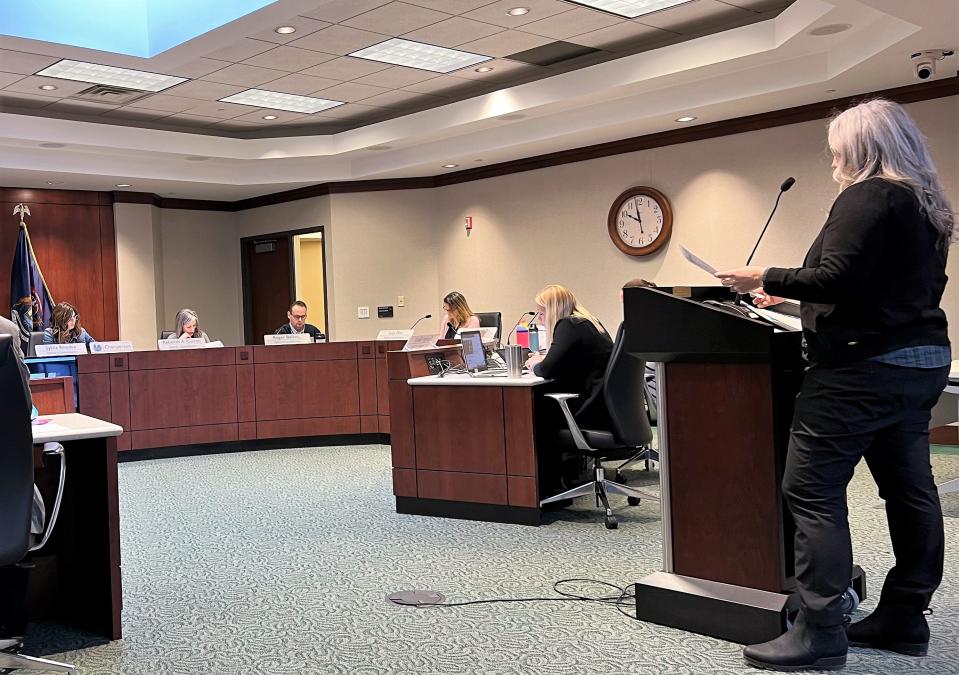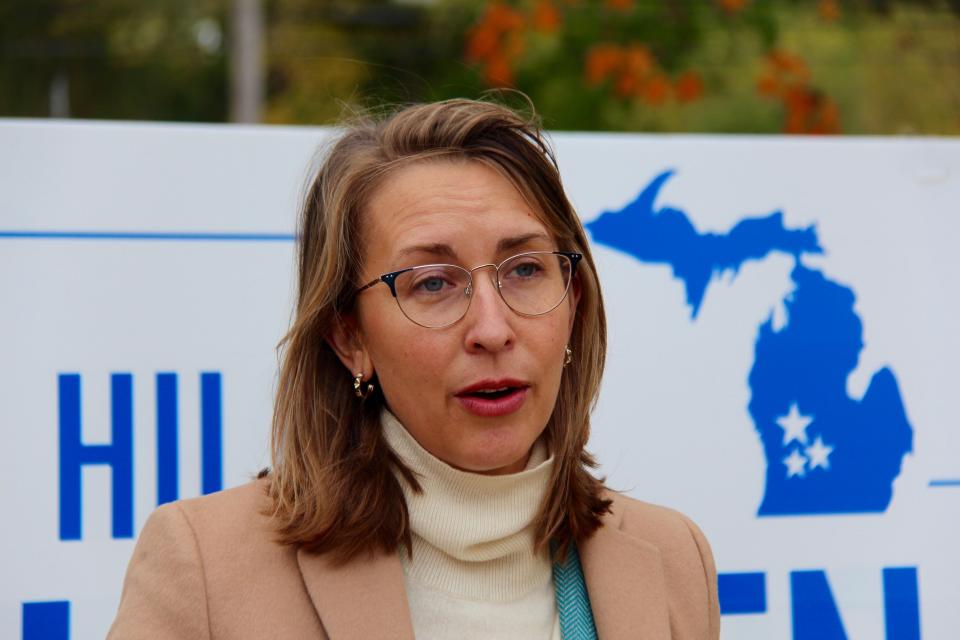AG: Ottawa Impact violated spirit of OMA, stronger transparency laws needed
OTTAWA COUNTY — The new Ottawa County Board of Commissioners majority clearly violated Michigan’s Open Meetings Act before taking office in January — in spirit, that is.
The conduct of Ottawa Impact commissioners, although a “blatant violation of the public’s trust and the tenets of government transparency,” didn't technically violate state law, according to Attorney General Dana Nessel.
More:Ottawa County Board abruptly fires administrator, hires former GOP candidate John Gibbs
More:Michigan AG reviewing shakeup in Ottawa County, possible Open Meetings Act violations
The state’s top law-enforcement official announced Thursday, Feb. 16, the results of a nearly six-week review of the Ottawa Impact commissioners’ decisions during the first organizational meeting of the year, during which they made sweeping changes to how county government operates without prior acknowledgment on an agenda.
After being sworn in, the board:
Fired administrator John Shay and replaced him with former GOP candidate John Gibbs without conducting a public interview
Eliminated the county’s Diversity, Equity and Inclusion Office
Chose a new health director to replace the already-named successor to Lisa Stefanovsky, Adeline Hambley, whose appointment had been approved by the state
Replaced the county’s counsel to Kallman Legal Group
Changed the county’s vision statement to "Where Freedom Rings"
Ottawa Impact is an upstart far-right political group borne from clashes over the county’s COVID-19 mitigation mandates in 2020. Its founders, Joe Moss and Sylvia Rhodea, were unsuccessful in suing the previous board of commissioners and the county's former health officer.
In response, they targeted seats on the board in 2022, recruiting like-minded candidates who agreed “traditional Republicans” weren’t enforcing true conservative policies.
They successfully defeated eight incumbent Republicans in the August primary and now hold eight seats on the 11-member board.
Their majority meant Ottawa Impact was able to enact significant change without public notice by altering board rules, allowing a simple majority vote to place new action items on the agenda. The original agenda, which must be made available prior to a meeting, had no indication of OI’s plans — and Michigan's Open Meetings Act doesn’t have any language preventing last-minute changes.
More:Did the majority of Ottawa County support Ottawa Impact at the polls? The data says no
Nessel said, while Ottawa Impact members didn't technically violate OMA, in the future, government entities shouldn't be able to follow in their footsteps.
“After review, there’s no question that there were things that occurred involving this county commission that were really disturbing,” Nessel told The Sentinel in an interview prior to Thursday’s announcement.
Nessel's office announced her intention to conduct a review after the board strategically executed the changes with little to no dialogue, indicating those decisions had been discussed and decided prior to commissioners being sworn in.
More:Ottawa Impact campaigned on transparency. In their first meeting, they blindsided the community.
In the following weeks, admissions from commissioners — as well as communications gathered via Freedom of Information Act requests — revealed OI commissioners had, in fact, discussed and decided several actions prior to Jan. 3. Had the commissioners already taken the oath, the act of meeting and making decisions as a majority outside a public meeting would have been illegal.
“Apparently, certain incoming board members elected to meet prior to the Jan. 3, 2023, meeting to discuss the motto change, termination of the public health director, corporation counsel, elimination of the DEI program and hiring of new legal counsel — and it was done outside of the public view to keep out any interference,” Nessel said.
“However, what we found is that there’s no actionable violation of OMA or any other relevant laws at this time. To me, it really has to do with the fact that OMA requires some significant strengthening.”
Nessel's office reviewed more than 40 citizen letters and emails — the most her office has received in connection with a single public body since she took office in 2019 — as well as each Ottawa County board meeting since January.
Nessel said, in the more than 70 public comments at the Jan. 24 meeting, the phrases “lack of transparency” and “compliance with the board’s rules and policies” dominated the discussion.
Nessel said she plans to request to testify before the Michigan Legislature to hold Ottawa County up as an example of “a real-world application of what happens when you have an OMA that’s so broad and, in many ways, big, that it allows for a real lack of transparency where the whole purpose is to ensure that transparency is there.”
In a letter to the board Thursday, Feb. 16, she plans to make recommendations to state lawmakers that include:
Requiring a public body to publish a meeting agenda at least 48 hours prior
Limiting the ability to modify an agenda during a meeting, with the exception of exigent, or emergency, circumstances
Amending the definition of “public official” to include those who have been elected or appointed to public positions — even if they haven’t taken their oath of office
At least one Michigan lawmaker representing parts of Ottawa County welcomed Nessel's conclusions.
"I have every confidence the state attorney general conducted a fair and thorough investigation and will rely on the results of their findings," U.S. Rep. Hillary Scholten told The Sentinel. "If they feel there is a need to strengthen state laws, I think that it's wonderful that she's taking the extra step to pursue that."
Scholten, who defeated now-Ottawa County Administrator John Gibbs for Michigan's Third Congressional Seat, said the hiring of Gibbs is of particular concern.
More:County attorney pleaded with Ottawa Impact not to fire Shay. 'You will send shock waves.'
"There certainly have been a lot of concerns raised about the way in which this happened and, to have an individual be appointed to such a powerful position behind closed doors without the consent of the public, especially on the heels of being rejected so resoundingly at the ballot box and rejected for a political appointment in Washington — even by his own party — because of some of his extremist views," she said.
"This is an individual who has been shown time and time again to be too extreme for government service. I think those are the concerns that individuals rightly have, because these views don't exist in a vacuum. They have real implications."
The history of OMA
The Open Meetings Act and its counterpart, the Freedom of Information Act, were written in 1976 and became law in 1977. The laws — known as Michigan’s Sunshine Laws — were designed to make government processes and information more open to the public (both were written in the post-Watergate, post-Vietnam war era).
Under OMA, public bodies must hold meetings open to the public, provide notice of those meetings, post agendas and keep minutes (records) of meetings. OMA also requires that officials not discuss or decide the public’s business in private if a quorum — the minimum number of voting members — of the board is present.
There have been several attempts to reform the laws since their inception. In 2016, after the Flint water crisis, a 10-bill package passed the state house overwhelmingly, but was stopped in the senate, where then-Sen. Majority Leader Arlan Meekhof — an Ottawa County Republican — failed to bring them forward in the committee he chaired. The bills died at the end of that legislative year.
Similar attempts were also unsuccessful in 2017 and 2019.
Last year, Gov. Gretchen Whitmer signed into law House Bill 4705, which expanded OMA to require public meetings of state licensing boards, state commission panels and state rule-making boards to be recorded.
Michigan is one of only two states in the country that still wholly exempts the governor’s office from the laws, and is among nine states where lawmakers are explicitly exempt. The state regularly receives one of the lowest grades by transparency watchdog organizations.
Nessel said the spirit of OMA is to ensure transparency in government by shedding light on official acts of public bodies and enhancing responsible decision making and promoting government accountability.

Despite Ottawa Impact's promises of transparency on the campaign trail, its commissioners have not engaged in any lengthy discussions during public meetings, and have continued to make agenda additions after meetings have begun. The group also notoriously avoids giving interviews to local media.
“The long and the short of it is, I think we need to make some really significant changes to OMA to make it incredibly clear what is permissible and what is not permissible,” Nessel said.
Nessel said there's no precedent for prosecutions over Open Meetings Act violations, primarily because the law is so vague and offenses are oftentimes difficult to prove.
More:Amid in-fighting, censures: What is the future for Ottawa County conservatism?
“Prosecutors don’t bring OMA cases — they just don’t. So, this was the first case we took as an official investigation into an OMA violation with the perspective of it potentially being a criminal act,” Nessel said.
The first time a public official intentionally violates OMA, he or she can be charged with a criminal misdemeanor and punished by a maximum fine of $1,000.
For a second offense within the same term of office, he or she can be charged with a misdemeanor and fined up to $2,000 and/or jailed for a maximum of one year.
A public official who intentionally violates the act is also personally liable for actual and exemplary damages up to $500, plus court costs and attorney fees.

'It's not just the statewides that matter'
Nessel said the situation in Ottawa County should underscore the importance for all Michigan residents to take more steps to be informed about their local elections and who's running to represent them in government.
“I hope it highlights to voters the importance of caring deeply about who your county commissioners are and who your other local officials are,” she said. “It’s not just the statewides that matter. It’s not just who is the president of the United States that matters.
“It’s your county officials. They make very important decisions that will affect the lives of the people they represent. But most people are not familiar with who their county commissioner is, and I think this case has really brought to light that we need to be deeply invested in it.”
Residents do have some recourse if they believe a public official or body is not adhering to the law.
Nessel outlined three:
Citizens may contact the audit section of the Community Engagement and Finance Division at the Michigan Department of Treasury for concerns over the expenditure of municipal funds (517-335-7469; 430 W. Allegan St., Lansing, MI 48922). The state treasurer forwards results of those audits to Nessel’s office for review for possible criminal or civil prosecution.
The Michigan Election Code provides for the recall of elected officials. For elected politicians with two-year terms — like Ottawa County commissioners — a recall cannot begin in the first or last six months of an official's term. Recall petitions must garner signatures from 25 percent of the number of persons in the official’s district who voted for governor in the most recent general election, in this case 2022.
Under the Open Meetings Act and the Michigan Constitution, any citizen has the right to commence a lawsuit against a public body to challenge a decision the public body has made, and citizens may also obtain a court order compelling a public body’s compliance with OMA. Citizens, if successful in a legal pursuit, would be entitled to court costs. “A lot of people don’t know that attorneys who bring these cases — and are successful — will be paid, ordered by the court," Nessel said.

At least one lawsuit already filed
At least one lawsuit has already been filed over the Jan. 3 meeting.
Ottawa County "Interim" Health Officer Adeline Hambley filed a lawsuit Friday, Feb. 10, in Ottawa County’s 20th Circuit Court, naming seven of the eight Ottawa Impact commissioners as defendants: Board Chair Joe Moss, Vice Chair Sylvia Rhodea, and Commissioners Lucy Ebel, Gretchen Cosby, Roger Belknap, Allison Miedema and Rebekah Curran.
Hambley is claiming the OI commissioners are preventing her from doing her job and “constructively terminated” her by voting to demote her to “interim” health officer. She's asking the court to declare her the rightful health officer, and instruct the board to go through a formal process, as outlined in state law, if commissioners have reason to remove her.
The case is expected to be heard in the spring.
More:Lawsuit: Health officer says Ottawa Impact commissioners targeted her
More:Sex Ed Week at GVSU has Ottawa Impact digging into county's health department
This outcome, Nessel said, was foreseeable.
“When you have these concerns of whether a public body has comported themselves to the law or not and you have these concerns about the deliberations, it opens yourself up to lawsuits,” she said. “Whether or not (Hambley) is successful in this lawsuit, this litigation is going to cost Ottawa County money.
“That’s why it’s so important to ensure you are literally crossing your T’s and dotting your I’s, so you don’t leave yourself open to the loss of tax dollars due to these lawsuits. You’re carrying the finances of this county on your back and you have a responsibility to ensure your actions are not going to needlessly cost your county what could be an extraordinary amount of money."
Scholten said it's vital for representatives to play their part.

"As a federal official, I'm working hard every day to make sure that we can return as much of the taxpayers dollars back to them here in district, and we can't have our unelected officials working against that initiative," Scholten said.
"It undermines the spirit and intent of what we're trying to do and it undermines the health and well-being of the residents of Ottawa County, which is obviously just a huge and important component of Michigan's Third Congressional District."
Subscribe:Get all your breaking news and unlimited access to our local coverage
As the board moves forward, Nessel hopes Ottawa Impact commissioners are taking heed.
“One would hope that (after) all the attention they’ve received — which is mostly not positive in nature — they would ensure that they are comporting their actions to the law and that they’re being very careful about the way in which they conduct their business.
“I don’t think it’s an exaggeration (to say) that they are the most carefully watched county commissioners in the state.”
— Sarah Leach executive editor of The Holland Sentinel. Contact her at sarah.leach@hollandsentinel.com. Follow her on Twitter @SentinelLeach.
This article originally appeared on The Holland Sentinel: AG: Ottawa Impact violated spirit of OMA, stronger transparency laws needed

